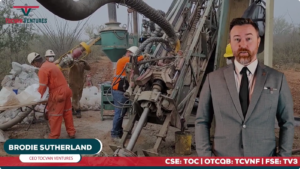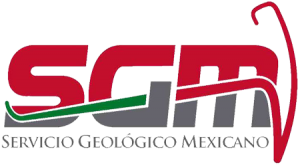TORONTO, April 4, 2012 /PRNewswire via COMTEX/ — TSX Venture Exchange – DIB Bolsa de Valores de Lima – DIB
Dia Bras Exploration Inc. (bvl:DIB) (“Dia Bras” or the “Company”) is pleased to announce that its drilling programme for resource expansion at the El Gallo mine of the Bolivar project has expanded the boundaries of the current resource. In addition, drilling at El Salto has shown that the Upper and Lower Skarns extend to this area, which is 600 m east of the current mining area.
Press Release Highlights:
El Gallo step-out drilling expands the El Gallo resource 100 m to the northeast.
Hole 394 intersects 24.24 m (true width) of 1.56% copper and 30.6 g/t Silver in Upper Skarn.
Six other holes intersect good grades of copper and silver in both Upper and Lower Skarns.
El Salto drilling intersects El Gallo-type mineralization 600 m east of El Gallo
Possible major expansion of El Gallo deposit through El Salto to La Montura
Three drill holes intersect good grades of copper, zinc and silver in Upper and Lower Skarns
Both El Gallo and El Salto deposits are open for hundreds of meters in several directions, which indicates major potential to expand these deposits
Complete NI 43-101 compliant resource estimate May 2012
Daniel Tellechea, President and CEO of Dia Bras, commented: “These results represent a potentially-major expansion of the resources of the Bolivar property. We know that the Upper and Lower Skarns extend for a distance of over 3,000 m, and our drilling is demonstrating that potentially-mineable zones of mineralization extend for hundreds of meters along strike and down dip. We have only just begun to discover the full potential of this extensively-mineralized area.”
Recent Drilling Results
El Gallo Area: This area (figure 1:Location Map of the Bolivar Mine Area) hosts thick manto-type mineralization in both the Upper and Lower Skarns, which are occasionally connected by chimneys that frequently are higher-grade in zinc than in copper. Drilling during 2012 has expanded the boundaries of the known resource blocks (figure 2:Map of the El Gallo Area), with assay results shown in the table below:
Hole From-To (m) Interval Est. True Cu% Zn % Au g/t Ag g/t Fe % Skarn
ID1 (m) Width (m)
379 112.40-122.10 9.70 7.78 1.03 0.04 0.02 25.3 11.7 Upper
380 107.25-113.60 6.35 5.30 2.10 0.02 0.10 49.6 14.5 Upper
383 174.55-183.25 8.70 7.90 1.16 0.02 0.36 13.5 25.5 Lower
390 166.55-171.30 4.75 4.57 1.74 0.05 0.03 23.1 15.5 Upper
and 225.95-239.20 13.25 13.00 2.15 0.06 0.18 31.7 18.3 Lower
394 86.55-115.65 29.10 24.24 1.56 0.20 0.11 30.6 30.5 Upper
395 205.55-210.85 5.30 5.00 0.99 0.13 0.40 19.1 22.4 Lower
and 216.70-218.30 1.60 1.30 3.80 0.05 4.73 18.0 20.2 Lower
397 42.25-47.10 4.85 4.85 0.70 4.26 0.03 17.4 38.1 Upper
Note 1: all holes have prefix DB12B
El Salto Area: This area hosts mineralization in both the Upper and Lower Skarns and lies between El Gallo to the west, and La Montura to the southeast – all areas of significant copper, zinc, silver and iron mineralization. This area was drilled to explore for mineralization in the vicinity of a NE-trending fault , which the Company’s geologists inferred to be an important feeder of mineralizing fluids that created the deposits at Gallo and Montura. Fault intersections and trends are known to be important controls on mineralization in the Bolivar area.
Drill results include the following:
Hole From-To Interval Est. True Width Cu% Zn % Au g/t Ag g/t Fe % Skarn
ID (m) (m) (m)
3731 108.00-111.30 3.30 3.05 0.84 0.07 0.01 7.5 5.0 Upper
and 120.53-129.55 2.80 2.75 0.80 0.03 0.16 60.1 14.4 Upper
and 341.50-348.70 7.20 6.73 1.01 0.09 0.45 13.0 27.8 Lower
3781 351.65-360.05 8.40 8.30 1.71 0.20 0.18 37.4 21.5 Lower
and 366.95-374.30 7.35 7.27 1.01 0.03 0.88 12.3 15.0 Lower
3892 93.45-96.35 2.90 2.90 0.19 8.41 0.01 12.0 3.0 Upper
and 290.15-304.50 14.35 13.83 1.20 0.14 0.41 23.2 33.0 Lower
Note 1: prefix DB11B Note 2: prefix DB12B
San Francisco Area: This area has been mined for over 18 months and has contributed high grade zinc and copper ore to both the Malpaso mill and the new Piedras Verde mill.
Drilling has commenced to expand mineralization in the Mina de Fierro and San Francisco areas (see figure 2:Map of the El Gallo Area). These deposits are on the southeast side of the fault that controlled the Breccia Linda mineralization (high grade copper and zinc in the Upper Skarn). This area is considered to have major potential to discover large deposits in both the Upper and Lower Skarns.
Significance of Drill Results
Drilling in the El Gallo and El Salto areas over the past few months has demonstrated that both the Upper and Lower Skarns are strongly mineralized over an extensive area. Mineralization in both skarns is open along strike and down dip, and the carbonate host rocks for the skarn mineralization are known to occur over an area of at least 3,000 x 1,000 m.
The potential to define mineable mineralization in the Bolivar area has been greatly expanded by these results. The Company intends to continue drilling these areas in order to increase significantly the mineable resources of the property.
During 2012, Dia Bras will also drill other targets identified by its exploration activities, such as:
Los Americanos: Copper-zinc-silver mineralized manto that extends more than 300 m along strike
Increíble: High-grade copper bodies at zone of intersection of Upper/Lower Skarns with the breccia pipe
Nathalie Fault: High-grade copper-zinc mantos in Upper and Lower Skarns
Bolivar District Overview
Dia Bras’ Bolivar property consists of 21 concessions covering approximately 21,620 hectares and is located in the historic Piedras Verde district in southwestern Chihuahua, which is within the Sierra Madre Precious Metals Belt of northwestern Mexico. Historic mining, prospecting and exploration for polymetallic Cu-Zn-Pb-Ag-Au deposits in the Belt have been carried out since the Spanish Colonial days.
At Bolivar, small historic mines, long abandoned and accessed only by foot paths, are scattered along the 5-km extension of the copper-stained cliffs that expose the mineralized skarns. From 1980 to 2000, some 300,000 tonnes of mineralized material were mined from mantos and chimneys while the Bolivar Mine (Alta Ley) was under the control of a private family. This included 195,000 tonnes from the Fernandez trend, 90,000 tonnes from the Rosario Trend and 15,000 tonnes from the Pozo de Agua area. Detailed production records for this period are not available, but are reported to be in the order of 50 tonnes per day, with the mined rock hand-sorted to an average grade of 5-6% Cu and 25-30% Zn.
Mineralization at Bolivar comprises chimney-manto skarn deposits in two general horizons, the Upper (US) and Lower Skarns (LS), and a breccia pipe (Increíble). The US contains Cu-Zn-(Au-Ag) mineralization while the LS contains Cu-Ag-Fe-(Zn-Au). The Upper and Lower Skarns are often connected by mineralized chimneys.
The Company commenced pilot-mining at the Bolivar Mine in February 2005, and through September 2011 processed 681,305 tonnes of mineralized rock at an average grade of 1.65% Cu and 8.47% Zn. During this period, the rock was shipped by road and rail to the Company’s Malpaso Mill.
In October 2011, Dia Bras commissioned its new, 1000 tpd Piedras Verde mill located on 5 km from the El Gallo mine. Mill throughput has been increased from 300 tpd at the Malpaso mill to 1,000 tpd at the new mill.
NI 43-101 Report
The Company has commissioned a NI 43-101 compliant resource calculation for the Bolivar property and the required property visit was made by a representative of Gustavson Associates, Lakewood, Colorado, during mid-March. The final report is expected during late April-early May.
Method of Analysis
Samples were prepared at the ALS Chemex lab facility in Chihuahua, Mexico, and analyzed by ICP and AA methods at their facilities in Vancouver, Canada. Diamond drill samples sent for analysis consisted of half NQ-size and BQ-size diamond core split on site, prepared by the ALS Chemex sample preparation laboratory in Chihuahua, Mexico, and assayed for Au by 50 g fire assay with AA finish, and for Ag by AA on 50 g split sample at the ALS Chemex North Vancouver Laboratory. Assays for Pb, Zn and Cu are analyzed by Induction Coupled Plasma (ICP) at ALS Chemex.
Quality Control
The quality assurance-quality control (QA-QC) of Dia Bras has been described in detail in both RPA’s NI 43-101 reports of December 2006 at Cusi and October 2005 for Bolivar.
The technical content of this news release has been approved by Thomas L. Robyn, Ph.D., CPG, RPG, a Qualified Person as defined in NI 43-101.
About Dia Bras
Dia Bras Exploration is a Canadian exploration & mining company focused on precious and base metals in Chihuahua State, other areas of northern Mexico, and most recently at its Yauricocha silver-lead-zinc-copper-gold mine in Peru. The Company is accelerating exploration at the Yauricocha property as well as pursuing the development and exploration of its most advanced Mexican assets – the Bolivar Property (copper-zinc-silver) and the Cusi Property (silver) and is exploring in Mexico several precious metal targets such as La Sidra gold project at the Bolivar Property, the Las Coloradas silver project at Melchor Ocampo (Zacatecas State), the Bacerac silver project (Sonora State), and the La Verde gold project at the Batopilas Property (Chihuahua State). Dia Bras is also exploring base metal projects in Mexico such as the Corralitos intrusion-hosted molybdenum deposit (Chihuahua State).
The Company’s shares trade on the Bolsa de Valores de Lima and TSX Venture Exchange under the symbol “DIB”.
Neither the TSX Venture Exchange nor its Regulation Services Provider (as that term is defined in the policies of the TSX Venture Exchange) accepts responsibility for the adequacy or accuracy of this news release.
Forward-looking Statements
Except for statements of historical fact, all statements in this news release without limitation regarding new projects, acquisitions, future plans and objectives are forward-looking statements which involve risks and uncertainties. There can be no assurance that such statements will prove to be accurate; actual results and future events could differ materially from those anticipated in such statements.
























